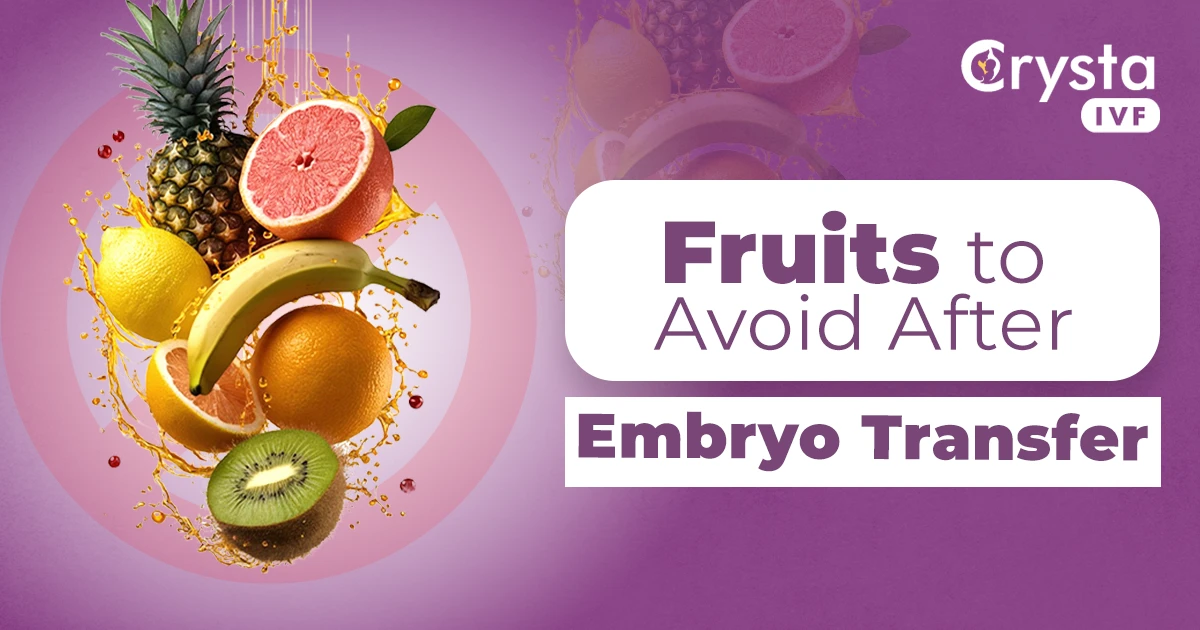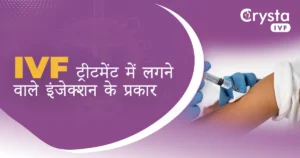You read it right. There’s nothing wrong with your eyes. In this article, we’ll talk about fruits you must avoid after embryo transfer. Well, not necessarily avoid but also not go overboard with it. Your journey with IVF can be both exciting and challenging. The real work starts when you get a confirmed pregnancy.
What you put in your body is equally important as your environment. Your food needs to be nourishing, healthy, and rich in minerals and vitamins. Your diet plays a crucial role in a successful pregnancy after embryo transfer. This is why you must listen to what our doctors tell you at Crysta IVF in Delhi.
This article might sound strange as we all have been chased by our parents who try to squeeze fruits into our mouths. But yes, after an embryo transfer, not all fruits are your friends. Now, sit back and make notes of all the fruits you must avoid or minimise the intake after an embryo transfer.
Btw, we have another article covering all the foods you must avoid after an embryo transfer, click here – https://crystaivf.com/blogs/foods-to-eat-and-avoid-after-embryo-transfer/. It might come in handy.
Now, where were we? Oh yes! Fruits that you need to steer clear from after having an embryo transfer.
- Pineapple
- Papaya
- Grapes
- Bananas
- Watermelon
- Dates
- Mangoes
- Kiwi
- Peaches
- Lemons
Let’s dissect why you must avoid these fruits.
- Pineapple: The high citric nature of pineapple could be not-so-welcoming for your situation. Their high bromelain content might lead to thinning of the blood, unwanted.
- Unripe Papaya: Unripe papaya contains papain. It’s a compound that can potentially induce miscarriage. It’s advisable to avoid this fruit during pregnancy or when attempting conception due to its abortifacient properties.
- Grapes (Especially Black): Grapes, especially the black ones, contain resveratrol, which can interfere with the implantation process.
- Bananas: Despite being nutritious, bananas’ high sugar content can cause rapid blood sugar spikes, potentially creating an unsuitable environment for successful implantation.
- Watermelon: We all know watermelon is one of the most refreshing fruits that exist. However, it can lead to bloating and gas, causing discomfort following an embryo transfer.
- Dates: Dates are rich in iron and can increase the body’s core temperature. This can impact the delicate phase of the post-embryo transfer.
- Mangoes: Known for their richness, mangoes can elevate body heat. There is a reason why it’s advised not to consume too many mangoes. It has also been observed that mangoes contain sorbitol, a laxative sugar content that can lead to loose motions. It can deplete essential fluid content in the body.
- Kiwi: High in Vitamin C, kiwi acts as a natural diuretic, possibly leading to dehydration if not balanced with adequate water intake during fertility treatments.
- Peaches: Recognized for their laxative effects, peaches might cause discomfort post-embryo transfer. Consider limited intake during this sensitive phase of fertility treatments.
- Lemons: The high citrus content in lemons may trigger stomach acidity, potentially causing discomfort. Exercise moderation or dilution to minimize adverse effects, especially during sensitive fertility treatments.
It’s not our purpose to scare you but to inform you so you can make informed decisions. Remember that each IVF journey is as unique as yours. One fruit might be harmful to other women with embryo transfer, but it may be healthy and completely harmless for you.
Therefore, it’s good to take expert advice before making any changes to your diet or routine, especially during such a sensitive situation, which can have negative health consequences. Also, keeping things in moderation is the key to a successful pregnancy. You must have heard the phrase, “Excess of anything is bad.” This phrase matches perfectly with the embryo transfer situation.
At Crysta IVF, we understand the intricate needs of every IVF journey. Our experienced doctors and nutritionists will personalize your diet plan, carefully considering your unique situation and preferences. Through comprehensive consultations and guidance, we ensure you navigate this crucial phase with optimal nutrition and minimized risks.
With Crysta IVF as your partner, you can make informed choices about your post-transfer diet, fostering the perfect environment for a healthy and successful pregnancy. Trust us to hold your hand every step of the way, turning your IVF dream into a joyful reality. For more information regarding IVF and Laser Assisted Procedure, visit our website https://crystaivf.com/ or call us at 893 893 5353




